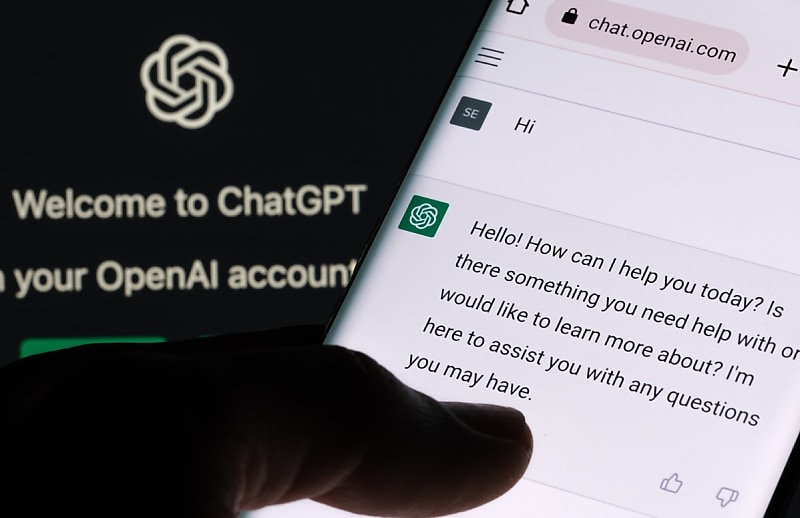The year accountants met AI
TechnologyWhether it’s for better or worse, one thing is certain – ChatGPT and its ilk have irrevocably changed the industry.

In February last year, Will Buckley, manager of Xero Australia, told Accountants Daily he had tested an AI tool called ChatGPT and believed it was “rich with possibilities” for accountants.
“I was excited to get into it and just see what it's capable of,” he said. “A couple of the questions that I chucked in there I got complete nonsense responses!”
In the same month, as more people caught onto the chatbot’s “possibilities”, the tool reached 100 million users, making it the fastest-growing consumer app in history after it was launched by tech start-up OpenAI in November 2022.
Commentators heralded the sophisticated chatbot as a breakthrough in generative AI and machine learning. The conventional accounting industry, however, approached the technology with trepidation.
Innovation-loving big four firms were among its first adopters. “AI is revolutionising the way we live and work,” said KPMG in March as it launched KymChat, a customised version of ChatGPT, to employees in the same month.
According to a survey by Deloitte, AI would “rapidly and significantly” disrupt one-quarter of the country’s economic activity.
The technology “instantly” changed industries including finance, ICT and media, professional services, education and wholesale trade, the firm said.
Software companies also scrambled to position themselves at the forefront of the AI boom, with Xero, Intuit, MYOB, Airwallex, Ignition and Zoho among those launching AI-enhanced features across their platforms.
For Xero, that meant bringing AI to its customer support portal to provide users with answers faster and applying machine learning to generate bank reconciliation predictions, automating routine manual tasks.
The ATO’s Smarter Data team also adopted AI models to improve their data analytics in areas such as landlord insurance and superannuation data matching.
According to assistant commissioner Tim Loh, “sophisticated data-matching programs provide all the clues needed to track down taxpayers with incorrect information in their tax return”.
The technology, which the ATO said could also detect superannuation underpayments 90 per cent of the time, quickly led to accountants becoming inundated by unprecedented levels of SG compliance audits.
In September, RSM partner Rick Kimberley told Accountants Daily that he had “never seen this level of auditing before”.
“In the last 12 months, it really has ticked up a gear. Every day I’m getting an email about another organisation getting audited, so it’s just non-stop.”
Smaller firms, on the other hand, remained cautious in comparison to their resource-rich counterparts at the top end of town.
“It’s very fashionable to talk about using AI tools like ChatGPT. But the reality is that most small and medium-sized businesses are still considering how to integrate them. In other cases, they don’t have the resources to use them properly or maybe they just don’t feel like they need them,” CPA Australia policy manager Gavan Ord said.
Indeed, the advent of technology that could resemble and at times exceed the capabilities of human intelligence inspired dread among workers in traditional accounting roles.
Reports from companies like Microsoft reinforced these concerns, finding that up to 36 per cent of accountants’ tasks could be automated by generative AI, while learning company Pearson said bookkeepers were most at risk – predicting 40 per cent of tasks to be replaced by AI.
“Many of the most affected white-collar roles contain repetitive tasks – such as scheduling appointments or answering and directing calls – that could be easily replicated by generative AI,” Pearson said.
However, even AI’s most fervent proponents maintained that its applications “always need human oversight”.
Speaking at Xero’s annual conference, Jason Staats, founder of Realize, an online community for accounting firm owners, said that “AI will never be authoritative” and would always need humans to verify its outputs.
AI general manager Soon-Ee Cheah agreed that AI was limited by the quality of data inputs and could not be trusted to perform accurately in specialised accounting applications.
“It’s not a case of if AI is going to make an error, but when,” Mr Cheah said.
As ChatGPT and other offshoots like Google’s Bard and Microsoft’s Bing Chat expand their user base and technology by the day, the debate has turned to AI’s ethics, governance and manner of adoption.
Meanwhile, speculative ponderings by accounting industry members over its potential applications, such as those made by the manager of Xero Australia in the early months of 2023, have all but disappeared.




